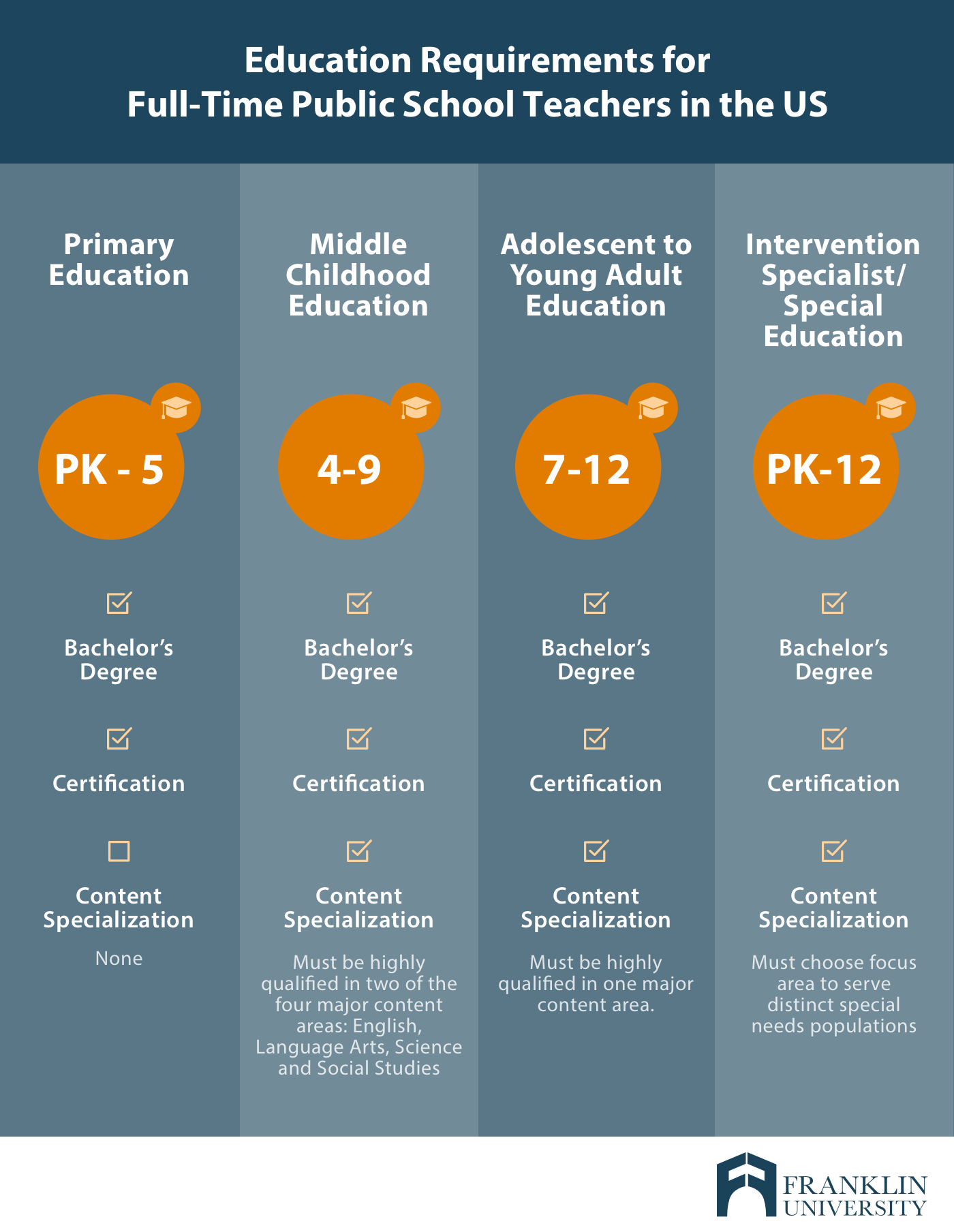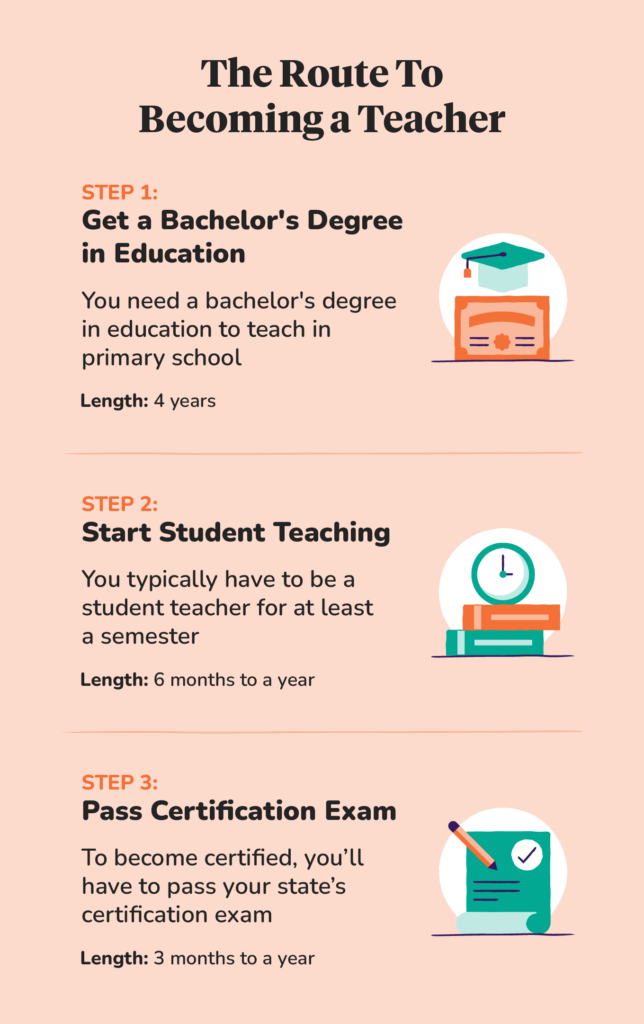Becoming a teacher requires earning a bachelor's degree in education and completing a teacher preparation program. Additionally, you'll need to obtain state certification.
Are you passionate about educating and inspiring others? Do you have a desire to make a positive impact on young minds? If so, pursuing a career in teaching may be the perfect path for you. In order to become a teacher, you must meet specific steps and qualifications.This guide will provide you with essential information on becoming a teacher, including the necessary education, training, and certification requirements. By following these steps, you can embark on a rewarding journey towards shaping the future through education.
Entering the World of Teaching
Teaching is a noble profession that plays a crucial role in shaping the minds of future generations. If you have a passion for education and a desire to positively impact young lives, then becoming a teacher might be the perfect career path for you.
In this section, we will explore the reasons why teaching is a rewarding and fulfilling profession, as well as the essential qualities that make a great teacher.
Why Teach?
Teaching offers a unique opportunity to make a difference in the lives of students and contribute to society as a whole. Here are some compelling reasons why teaching can be a fulfilling career choice:
- Impact: As a teacher, you have the power to shape the future by imparting knowledge, skills, and values to your students. Each day, you can witness the growth and development of young minds and know that you played a part in their journey.
- Inspiration: Teachers can inspire and motivate students to reach their full potential. By fostering a supportive and engaging learning environment, you can ignite a passion for learning and help students discover their talents and interests.
- Community: Teaching allows you to become an integral part of a community. You can collaborate with colleagues, parents, and other stakeholders to create a positive and inclusive educational experience for all students. The relationships you build can provide support and professional growth throughout your career.
- Continual Learning: As a teacher, you never stop learning. You have the opportunity to stay updated with the latest research and educational practices, attend professional development workshops, and constantly improve your teaching methods. This ongoing learning journey keeps your own knowledge and skills sharp.
Qualities of a Great Teacher
Beyond a passion for education, great teachers possess certain qualities that set them apart. Here are some essential qualities that make a great teacher:
- Patience: Teaching can be challenging, and students may learn at different paces. A great teacher exercises patience and understands that each student has unique learning needs.
- Communication: Effective communication is vital in the teaching profession. Great teachers can convey complex concepts simply and engagingly, while also listening actively to their students.
- Adaptability: The ability to adapt to different learning styles and adjust teaching strategies accordingly is crucial for a great teacher. Flexibility allows for personalized instruction and ensures that each student's needs are met.
- Passion: A genuine passion for teaching and a love for the subject matter can ignite enthusiasm in students. Great teachers inspire curiosity and a thirst for knowledge.
- Empathy: Understanding and empathizing with students' experiences and challenges fosters a supportive and inclusive learning environment. Great teachers show empathy and create a safe space for students to express themselves.
By embodying these qualities, you can become a teacher who not only imparts knowledge but also inspires and empowers students to reach their full potential.
Educational Pathways
To become a teacher, there are various educational pathways to consider. One common route is obtaining a bachelor's degree in education, followed by earning a teaching certification. Other options include alternative certification programs and graduate-level education degrees. Researching different pathways and requirements can help aspiring teachers achieve their goals.
Becoming a teacher is an admirable career path that requires dedication, passion, and a strong educational foundation. There are several educational pathways to becoming a teacher, including undergraduate degrees and alternative certification programs. In this post, we will explore these pathways in detail.Undergraduate Degrees
Obtaining an undergraduate degree is one of the most common pathways to becoming a teacher. Most states require a bachelor's degree in education or a related field for teacher certification. Undergraduate programs for aspiring teachers typically combine coursework in education theory, classroom management, and teaching methods with practical experience through student-teaching internships.Alternative Certification Programs
Alternative certification programs offer a non-traditional pathway to becoming a teacher. These programs are designed for individuals who have a bachelor's degree in a field other than education and want to transition into teaching. Alternative certification programs vary by state and can include online coursework, mentorship, and teaching internships.Online Alternative Certification Programs
Online alternative certification programs are becoming increasingly popular and offer flexibility for individuals who are already working in another field. These programs typically include online coursework and teaching internships that can be completed while working full-time.Teach for America
Teach for America is a popular alternative certification program that places recent college graduates in low-income schools for two years. Teach for America provides training and support for its participants and can lead to a teaching certification.Conclusion
In conclusion, there are various educational pathways to becoming a teacher, including undergraduate degrees and alternative certification programs. Each pathway has its own requirements and benefits, and it's important to research and choose the pathway that is right for you.Certification Requirements
When it comes to becoming a teacher, understanding the certification requirements is crucial. Each state has its own set of regulations and assessments that aspiring educators must complete to obtain their teaching license. Here's a closer look at the certification requirements, including Praxis exams and state-specific certifications.
Praxis Exams
The Praxis exams are standardized tests that assess the academic skills and subject-specific knowledge of teaching candidates. These exams are administered by the Educational Testing Service (ETS) and are a common requirement for teacher certification in many states.
Passing these exams is essential for demonstrating proficiency in core subjects and specialized areas of instruction.
State-specific Certifications
State-specific certifications refer to the unique licensure requirements set by individual states. Each state has its own guidelines for teacher certification, including the completion of specific coursework, classroom experience, and additional assessments.
Prospective educators must familiarize themselves with the specific criteria outlined by their state's Department of Education to ensure they meet all the necessary qualifications.
Specializations in Teaching
When it comes to becoming a teacher, there are various specializations to consider. Each specialization offers unique opportunities to make a difference in the lives of students. Let's explore some of the key specializations in teaching.
STEM Education
STEM education focuses on science, technology, engineering, and mathematics. It equips educators to inspire students in these critical fields, preparing them for future careers. Teaching STEM subjects can involve hands-on experiments, coding, and problem-solving activities.
Special Education
Special education teachers work with students who have diverse learning needs. They adapt curriculum and teaching methods to support students with disabilities, learning disorders, or behavioral challenges. Special education teachers play a vital role in creating inclusive learning environments.
Language and Arts
Teaching language and arts encompasses subjects like English, literature, foreign languages, and visual or performing arts. Educators in this specialization foster creativity, critical thinking, and communication skills among their students. They may also explore cultural elements and historical contexts within their lessons.
Classroom Management Techniques
Discover effective classroom management techniques that will help you become a successful teacher. From establishing clear expectations to incorporating engaging activities, these strategies will create a positive learning environment for your students. Master the art of classroom management and enhance your teaching skills.
Classroom Management Techniques are essential for any aspiring teacher to learn. One of the most important techniques is creating a positive environment for students to learn and grow. This can be achieved through various methods, such as positive reinforcement, clear communication, and active listening. Another crucial aspect of classroom management is effective discipline strategies to ensure a safe and respectful learning environment.Creating a Positive Environment
Creating a positive environment in the classroom is crucial for students to feel comfortable, engaged, and motivated. One of the best ways to create a positive environment is by using positive reinforcement. This can be done by praising students for their efforts and achievements, providing incentives, and recognizing positive behavior.Effective Discipline Strategies
Effective discipline strategies are crucial for maintaining a safe and respectful learning environment. One of the most effective strategies is setting clear rules and consequences. This helps students understand what is expected of them and the consequences of their actions.Leveraging Technology in Education
Leveraging technology in education is crucial for aspiring teachers to enhance their skills. By embracing digital tools and online platforms, educators can access a wide range of resources, collaborate with colleagues, and engage students in innovative ways.
Embracing technology can revolutionize the teaching profession and empower teachers to become more effective in the classroom.
In this digital age, technology has revolutionized the way we learn and teach. Aspiring educators can leverage technology to enhance their teaching skills and provide more engaging and interactive learning experiences for their students.Digital Tools For Engagement
Digital tools offer teachers a multitude of ways to engage their students and make learning more interactive and fun. One such tool is Kahoot, a game-based learning platform that allows teachers to create quizzes, surveys, and discussions to engage their students in a fun and competitive way.Online Learning Platforms
Online learning platforms provide teachers with a wealth of resources and tools to create engaging and interactive lessons. One such platform is Edmodo, a social learning network that connects teachers and students in a safe and secure environment.Continuous Professional Development
In the field of education, continuous professional development is essential for teachers to stay updated with the latest trends and methodologies. It plays a crucial role in enhancing teaching skills, improving student outcomes, and staying competitive in the job market.
Workshops And Seminars
Attending workshops and seminars provides teachers with valuable opportunities to learn from experts in the field, exchange ideas with colleagues, and gain insights into innovative teaching strategies. These events cover a wide range of topics, including classroom management, technology integration, and student engagement, enabling educators to enhance their pedagogical practices.
Advanced Degrees
Pursuing advanced degrees such as master's or doctoral programs allows teachers to deepen their subject knowledge and expertise. These higher qualifications equip educators with advanced teaching techniques, research skills, and leadership capabilities, empowering them to make significant contributions to the field of education.

Credit: www.franklin.edu
Landing Your First Teaching Job
When it comes to landing your first teaching job, it's important to stand out as a candidate. Building a standout resume and acing the interview are crucial steps in securing a teaching position.
Building a Standout Resume
Creating a standout resume is essential for catching the attention of potential employers. Emphasize relevant teaching experiences, certifications, and educational background. Use action words and quantifiable results to highlight achievements.
Acing the Interview
Prepare for the interview by researching the school and understanding its values and culture. Practice answering common interview questions and come prepared with examples that demonstrate your teaching abilities. Show enthusiasm and passion for education during the interview.

Credit: www.240tutoring.com
Frequently Asked Questions
What are the Steps to Become a Teacher?
To become a teacher, you need to follow these steps: 1. Earn a bachelor's degree in education or a related field. 2. Complete a teacher preparation program, which includes student teaching. 3. Obtain a teaching license or certification in your state.
4. Apply for teaching positions and gain classroom experience. 5. Continuously engage in professional development to enhance your teaching skills.
What is Required to Be a Teacher in Texas?
To be a teacher in Texas, you need a bachelor's degree, completion of an approved educator preparation program, and passing scores on the appropriate teacher certification exams. Additionally, a background check and fingerprinting are required.
How Many Years is It to Be a Teacher?
It takes about 4 years to become a teacher. You need a bachelor's degree in education or a related field.
What is the Fastest Way to Become a Teacher in Texas?
The fastest way to become a teacher in Texas is to earn a bachelor's degree in education or a related field, complete a teacher preparation program, pass the required exams (such as the Texas Examinations of Educator Standards), and apply for a teaching certificate through the Texas Education Agency.
Conclusion
The journey to becoming a teacher is filled with passion, dedication, and continuous learning. By following the steps outlined in this blog post, such as obtaining the necessary qualifications, gaining experience through internships or volunteer work, and networking with other educators, you can pave the way toward a fulfilling career in education.
Remember, it's not just about imparting knowledge, but also shaping the minds and hearts of future generations. Embrace the challenges, embrace the rewards, and embark on your path to becoming an inspiring teacher.


